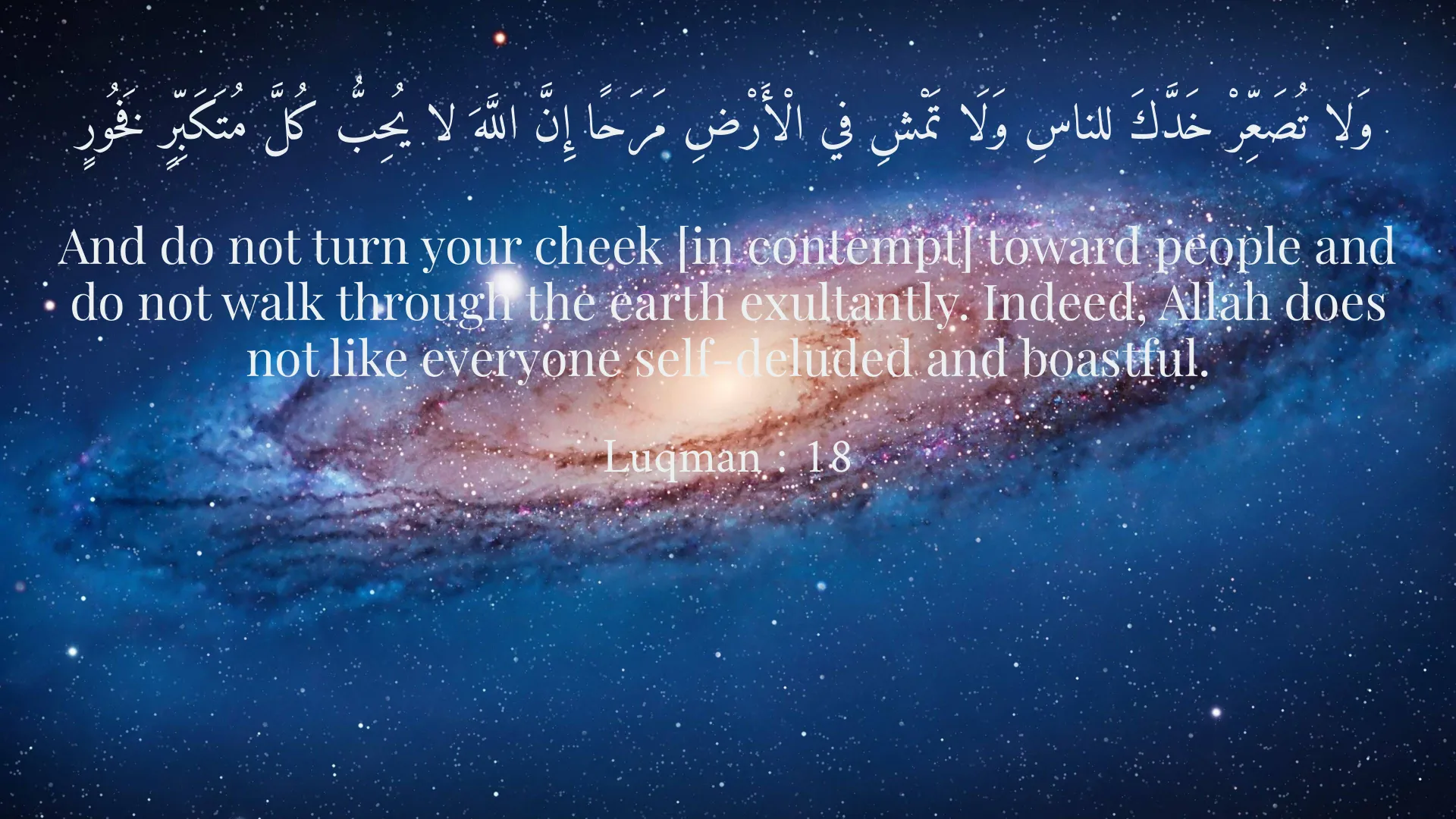Quranic Answer

### The Condemnation of Arrogance and Pride in the Holy Quran Arrogance and pride are condemned in various religious teachings, but there are few texts that emphasize these traits' negative implications as strongly as the Holy Quran. These two characteristics are considered harmful not only to the individual exhibiting them but also to society at large. The Quran warns humanity against the feelings of superiority and boasts of one’s accomplishments, painting a clear picture of how these traits can lead one astray from the path of righteousness. #### Divine Warnings Against Arrogance In Surah Luqman, verse 18, Allah provides a profound admonition regarding arrogance: "And do not turn your cheek [in contempt] toward people and do not walk through the earth exultantly. Indeed, Allah does not like everyone self-deluded and boastful." This verse encapsulates the essence of humility, urging individuals not to flaunt their superiority over others or to show contempt. The language used is definitive, warning against the consequences of such behavior. It indicates that when one begins to feel a sense of arrogance, it is crucial to remember one's common humanity. Arrogance can often lead to a sense of isolation from others, creating a false perception of self-worth that is built on the misguided belief of being better than others. Such an attitude can fracture social bonds and dismantle unity within communities. This divine warning serves as a reminder that arrogance does not elevate one's status but instead lowers it in the eyes of God. #### The Roots of Our Existence The Quran highlights the idea that all human beings stem from the same origin, fostering empathy and understanding among individuals. The reminder that God sees all of humanity on equal footing counters the inflated sense of self that often accompanies pride. This notion encourages the understanding that one does not have the monopoly on blessings or success; they are all gifts from Allah, highlighting the importance of humility. Furthermore, in Surah Al-An'am, verse 83, Allah elucidates the signs of true faith as being found in those who believe in Him sincerely and consciously avoid arrogance. This connection between true faith and humility reinforces the significance of staying grounded. Recognizing that one’s place in the universe is that of servitude to the divine and mutual regard toward fellow human beings is essential in avoiding the pitfalls of pride. #### Cultivating Humility In a world filled with competition and comparison, cultivating humility can be a challenging endeavor. However, it is a worthwhile pursuit that can transform one's character and mitigate the traits of arrogance and pride. To nurture humility, individuals should focus on gratitude and reflection. One practical method is to engage in daily reflections on the blessings one possesses, recognizing that these gifts stem from Allah's grace. Engaging in gratitude can shift one’s perspective from self-importance to appreciation, acknowledging that others also contribute to one’s success and well-being. By practicing humility, an individual can foster meaningful connections with others and create a sense of community that benefits everyone involved. Additionally, maintaining a conscious awareness of the fleeting nature of life and the inevitability of death can help one understand that pride offers no true advantage. Life is temporary, and the material achievements or societal status that might lead to arrogance will ultimately fade away. This mindfulness encourages individuals to approach life with a sense of purpose grounded in humility rather than inflated pride. #### Seeking Forgiveness and Displaying Humility Regularly seeking forgiveness and integrating humility into one’s prayers can help reinforce the importance of lowliness before God. Practicing humility in one’s spiritual life not only makes one more appreciative of Allah’s blessings but also helps maintain sincerity in worship. The act of seeking forgiveness serves as a reminder that no one is infallible; acknowledgment of one’s shortcomings fosters a spirit of humility and encourages personal growth. In one’s prayers, the emphasis on displaying humility can manifest in various forms, such as supplicating sincerely and thanking Allah for the mercies bestowed upon oneself. By regularly submitting to God’s will and recognizing one’s position as a servant, the walls built around pride can begin to crumble. #### Conclusion Arrogance and pride, as condemned in the Holy Quran, stand as significant barriers in the spiritual path of an individual. These traits not only impair one's relationship with Allah but can also disrupt social harmony and relationships with others. By embracing humility and acknowledging our shared humanity, we can navigate away from arrogance and foster a more compassionate society. Understanding that all our blessings come from Allah encourages gratitude and reflection, enhancing our spiritual growth and ability to connect with others. Ultimately, it is through seeking forgiveness, practicing humility, and maintaining awareness of life’s transient nature that we can overcome the temptations of pride and arrogance. Thus, as we strive to walk the righteous path laid down by Allah, let us always remind ourselves of the powerful principles taught in the Quran, guiding us to a life of humility, gratitude, and true faith.
Related Verses
وَلا تُصَعِّرْ خَدَّكَ للناسِ وَلَا تَمْشِ في الْأَرْضِ مَرَحًا إِنَّ اللَّهَ لا يُحِبُّ كُلَّ مُتَكَبِّرٍ فَخُورٍ
And do not turn your cheek [in contempt] toward people and do not walk through the earth exultantly. Indeed, Allah does not like everyone self-deluded and boastful.
Luqman : 18
تِلْكَ حُجَّتُنَا آتَيْنَاهَا إِبْرَاهِيمَ عَلَى قَوْمِهِ ۖ نَرْفَعُ دَرَجَاتٍ مَّن نَّشَاءُ ۖ إِنَّ رَبَّكَ حَكِيمٌ عَلِيمٌ
This is Our proof which We gave to Abraham against his people. We raise in degrees whom We will. Indeed, your Lord is Wise and Knowing.
Al-An'am : 83
Short Story
One day, a man hid in his heart the belief that he was superior to others. He attended a social event and belittled a few people with his words. However, suddenly he recalled the verses of the Quran that urged him to avoid arrogance. He apologized and tried to make humility the guiding principle of his life from that day forward.